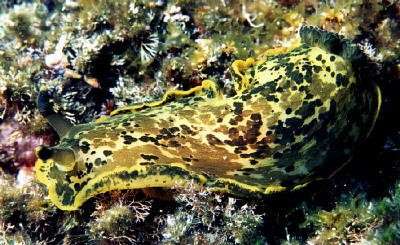
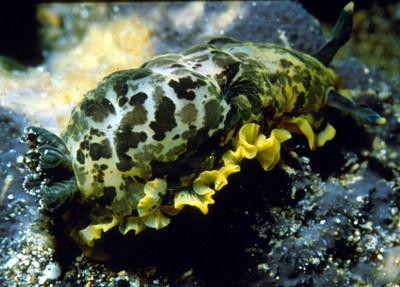
Dendrodoris limbata
(Cuvier, 1804)
Order: NUDIBRANCHIA
Suborder: DORIDINA
Superfamily: EUDORIDOIDEA
Family: Dendrodorididae
DISTRIBUTION
Endemic to the Mediterranean Sea. [But see notes below of records from the Atlantic coast of France]
PHOTO
UPPER: Croatia, Moscenicka Draga, divesite "Villa Istra", March 04, 1998, 5cm long, 3m depth. Photo: Erwin Koehler.
LOWER: Photo: Conxita Avila.
"Dendrodoris limbata (Cuvier, 1804) is endemic to the Mediterranean Sea. It is characterized by having a narrow mantle margin and a yellow (or whitish) line around the mantle edge. Some specimens are spotted and some are completely black, but all of them have the yellow line I mentioned." ... Angel Valdes.
Compare with other two species from the northeastern Atlantic: Dendrodoris grandiflora and Dendrodoris herytra. See Angel Valdes' comparison of the three species.
• See Alex Vanhaelen's message and Angel Valdes's message of this species on the Atlantic coast of France.
Reference:
• Valdes, A., Ortea, J., Avila, C. & Ballesteros, M. (1996) Review of the genus Dendrodoris Ehrenberg, 1831 (Gastropoda: Nudibranchia) in the Atlantic Ocean. Journal of Molluscan Studies, 62: 1-31.
Rudman, W.B., 2000 (May 27) Dendrodoris limbata (Cuvier, 1804). [In] Sea Slug Forum. Australian Museum, Sydney. Available from http://www.seaslugforum.net/find/dendlimb
Related messages
Dendrodoris limbata from Thau, French Mediterranean
November 27, 2007
From: Dominique Horst

Hello Bill,
This should be Dendrodoris limbata, which was the most widespread slug at this time.
Locality: Thau, 3 m, France, Mediterranean sea, 11 November 2007. Length: 5 cm. Photographer: Dominique Horst & Eric Poisson.
Kind regards,
Dom.
dominique.horst@wanadoo.fr
Horst, D., 2007 (Nov 27) Dendrodoris limbata from Thau, French Mediterranean. [Message in] Sea Slug Forum. Australian Museum, Sydney. Available from http://www.seaslugforum.net/find/21134
Thanks Dom.,
Bill Rudman
Rudman, W.B., 2007 (Nov 27). Comment on Dendrodoris limbata from Thau, French Mediterranean by Dominique Horst. [Message in] Sea Slug Forum. Australian Museum, Sydney. Available from http://www.seaslugforum.net/find/21134Dendrodoris limbata from the Atlantic coast of France
February 2, 2007
From: François Le Méhauté

Hello,
Here is some pictures of a dorid (I don't know it latin name) that we have observed only in Saint-Brieuc Bay off Saint-Quay-Portrieux (northern Brittany, France, Atlantic Ocean). We don't see it in others places in Britanny.
Locality: Saint-Quay-Portrieux, 25 metres, France, Atlantic Ocean, 01 October 2006. Length: 60 to 80 mm. Photographer: Dominique Marquet.
We can especially observe it in about twenty to thirty meters of water, often on the sand (coarse sand?) as we can see on one of the pictures.
Best regards
François Le Méhauté
flemehaute@club.fr
Le Méhauté, François, 2007 (Feb 2) Dendrodoris limbata from the Atlantic coast of France. [Message in] Sea Slug Forum. Australian Museum, Sydney. Available from http://www.seaslugforum.net/find/19366
Dear François,
This is an interesting find. It is Dendrodoris limbata which is usually found only in the Mediterranean Sea. This is only the third time this species has been reported from outside the Mediterranean [see message #3883], so either it has recently expanded its distribution or there are more people like you looking for nudibranchs
Best wishes,
Bill Rudman
Dendrodoris limbata from Mediterranean France
June 28, 2005
From: Patrick Noel

Sea slug found in étang de Thau, in France. about 5-8 cm long, very visible orange-golden rim. Photo taken in June. Very common (many individuals seen per dive).
Locality: Etang de Thau, France. Mediterranean coast. Depth: 5 m. Length: 5-8 cm. 4 June 2005. muddy and weedy bottom. Photographer: Patrick Noel
Patrick Noel
http://perso.wanadoo.fr/pnoel/
patricknoel@wanadoo.fr
Noel, P., 2005 (Jun 28) Dendrodoris limbata from Mediterranean France. [Message in] Sea Slug Forum. Australian Museum, Sydney. Available from http://www.seaslugforum.net/find/14072Dear Patrick,
The yellow edge is a good indicator of this species. It is Dendrodoris limbata. It often has a mottled grey and black mantle, but this is the only European species of Dendrodoris which can have a yellow edge.
Best wishes,
Bill Rudman
Dendrodoris grandiflora or D. limbata?
October 13, 2003
From: Adam Petrusek

Dear Bill,
Which species is this black small (~1 cm) specimen of Dendrodoris? Is the narrow line at the margin "yellow enough" to identify it as D. limbata or is it just small D. grandiflora?
Locality: Adriatic sea, near Sumartin, island Brac, Croatia.
Date: September 9, 2003
Photographed in the aquarium during the Mediterranean Marine Fauna excursion of the Charles University, Prague. Photo: Martin Cerny.
Thank you for the answer.
All the best,
Adam
petrusek@cesnet.cz
Petrusek, A,, 2003 (Oct 13) Dendrodoris grandiflora or D. limbata?. [Message in] Sea Slug Forum. Australian Museum, Sydney. Available from http://www.seaslugforum.net/find/11187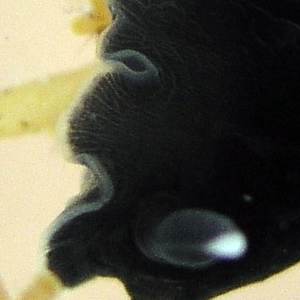
Dear Adam
Juveniles of D. grandiflora are red, so since this is less than 1cm I am assuming it is a juvenile. That would suggest its a juvenile D. limbata. I agree that the mantle edge is hardly yellow but Valdes et al (1996) do say that specimens with a 'white' edge have been reported, if rarely.
Best wishes
Bill Rudman
Dendrodoris limbata from Tunisia
May 7, 2003
From: Anis


Dear Bill,
I found this sea slug in a coastal lagoon, "Lac de Tunis" [south section] in Tunis, Tunisia, North Africa. Depth: 0 to 1m some time between January and March, 2003.
Can you identify it please.
Thanks,
Anis
bensouissi.jamila@inat.agrinet.tn
Anis, 2003 (May 7) Dendrodoris limbata from Tunisia. [Message in] Sea Slug Forum. Australian Museum, Sydney. Available from http://www.seaslugforum.net/find/9707Dear Anis,
I am pretty sure this is a black colour form of Dendrodoris limbata. Angel Valdes discusses the differences between Dendrodoris species in the Mediterranean in an earlier message. As he mentions there, all three species from your region have a red juvenile colour form. I suspect the reddish animal in your other message is a juvenile Dendrodoris limbata.
Best wishes
Bill Rudman
Juvenile Dendrodoris limbata from Tunisia
May 7, 2003
From: Anis

Dear Bill,
I found this sea slug in a coastal lagoon, "Lac de Tunis" [south section] in Tunis, Tunisia, North Africa. Depth: 0 to 1m some time between January and March, 2003.
Can you identify it please.
Thanks,
Anis
bensouissi.jamila@inat.agrinet.tn
Anis, 2003 (May 7) Juvenile Dendrodoris limbata from Tunisia. [Message in] Sea Slug Forum. Australian Museum, Sydney. Available from http://www.seaslugforum.net/find/9709Dear Anis,
This is a species of Dendrodoris. As I mentioned in your other message, all three species of Dendrodoris from your region have a red juvenile colour form. I suspect this is a late juvenile of Dendrodoris limbata in the process of changing from red to black.
Best wishes
Bill Rudman
Dendrodoris limbata from Turkey
October 6, 2002
From: Baki Yokes


Dear Bill,
Here are two photos of Dendrodoris limbata, showing colour variation observed around the coast of Turkey. This species is very common in the Sea of Marmara. In most of the diving sites you can see 1-2 specimen per meter square. Their colour is varying from dark green to light yellow, but mostly a mixture of them. They are rarely observed in Aegean or Mediterranean waters, always found hiding beneath the rocks.
Upper Image:
Istanbul, Turkey, October 2001. Divesite: Yassiada, Depth: 20m, Size: 6cm.
Lower Image:
Bodrum, Turkey, January, 1996. Divesite: Karaada, Depth: 6m, Size: 7cm.
Photos: Baki Yokes
Best wishes
Baki
bakiyokes@turk.net
Yokes, B., 2002 (Oct 6) Dendrodoris limbata from Turkey. [Message in] Sea Slug Forum. Australian Museum, Sydney. Available from http://www.seaslugforum.net/find/8009Thanks Baki,
There is certainly a colour range in this species. I can see the yellowish border in your uniformly grayish black animal, which Angel Valdes in his message said was a constant character of all colour forms of this species.
Best wishes,
Bill Rudman
Dendrodoris limbata from the Mediterranean
August 1, 2002
From: Marina Poddubetskaia


Dear Bill,
There are some photos of Dendrodoris limbata. This animal was found under a stone.
Date: July 05, 2002
Location: Cerbere, France [Mediterranean coast]
Site: Les Chambres
Depth: 20m
Size: about 4cm
Photos: Marina Poddubetskaia - Nembro website
Best wishes,
Marina.
nembro@nembro.info
Poddubetskaia, M., 2002 (Aug 1) Dendrodoris limbata from the Mediterranean. [Message in] Sea Slug Forum. Australian Museum, Sydney. Available from http://www.seaslugforum.net/find/7552Thanks Marina,
Bill Rudman
Dendrodoris limbata - colour variation
March 1, 2001
From: Constantine Mifsud
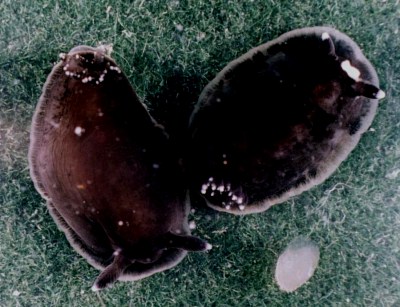
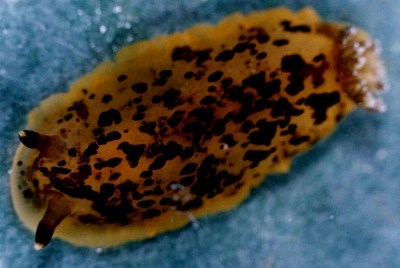
Bill,
I am posting a photo with the two extreme forms of Dendrodoris limbata from the Mediterranean. These two forms from Malta were found a few metres apart from the same area at 1m depth.
Regards,
Constantine Mifsud
kejdon@orbit.net.mt
Mifsud, C., 2001 (Mar 1) Dendrodoris limbata - colour variation. [Message in] Sea Slug Forum. Australian Museum, Sydney. Available from http://www.seaslugforum.net/find/3879Thanks Constantine,
By coincidence your message arrived the day I was posting Angel Valdes's message concerning a second record of this species on the Atlantic coast of France. Some of these species of Dendrodoris are certainly very variable in colour.
Best wishes,
Bill Rudman
Dendrodoris limbata from French Atlantic
February 28, 2001
From: Angel Valdés

Dear Bill,
I have recently received from Gery Parent this photo taken by Pierre Cottin in the Port of Saint-Quay Portrieux (Northern France). This animal in the photo is a specimen of Dendrodoris limbata and this constitutes the second record of this species from the Atlantic coast of France. So the record by Alex Vanhaelen on the Forum is not an isolated case anymore. Apparently Pierre Cottin has been finding this species in the area since 1991.
The Atlantic coast of France has been intensively studied during many years (since the work of Cuvier in 1804), and this species has only been found recently. I find very hard to believe that this species was there and nobody collected it. I suspect the geographic range of D. limbata has changed during the last years, and this species is moving further north probably as a consequence of rising of water temperature. But other explanations for these records such as human introduction can not be discarded.
It would be very interesting to see if this species is collected in the Atlantic coast of Spain and southern England.
All the best,
Angel
avaldes@CalAcademy.org
Valdes, A., 2001 (Feb 28) Dendrodoris limbata from French Atlantic. [Message in] Sea Slug Forum. Australian Museum, Sydney. Available from http://www.seaslugforum.net/find/3883Thanks Angel,
Ands thanks to Gery and Pierre for passing the information on. A very interesting find
Bill Rudman
Re: Dendrodoris limbata from Brittany
December 22, 2000
From: Alex VANHAELEN
Dear Bill and Angel
Thanks for your quick help.
Your news is quite a surprise for Christian PIRON (the discoverer) and myself.
You made two more happy people.
I would like to wish you and all the Forum contributors a Merry Christmas and a lot of happy findings in 2001.
Alex
a_vanhaelen@hotmail.com
Vanhaelen, A., 2000 (Dec 22) Re: Dendrodoris limbata from Brittany. [Message in] Sea Slug Forum. Australian Museum, Sydney. Available from http://www.seaslugforum.net/find/3417Dear Alex,
Glad we could help. Keep us informed of other animals you come across.
Best wishes,
Bill Rudman.
Unknown dorid from France
December 21, 2000
From: Alex Vanhaelen


Dear Bill,
My name is Alex VANHAELEN, from Belgium. This dorid was spotted by an acquaintance (Christian PIRON) at ERQUY (N.E. Atlantic-France - northern coast of Brittany) at the end of september 2000.
Length: 8 to 9 cm.; Number: 5 to 6 animals, sighted by several divers; Depth: 10 m.;
Eggs: ribbon, about 4 cm. in breadth, color pale yellow. They were seen on several algae, sponges and hydrozoa.
1) The surface of the back appears to be without knobs, quite smooth.
2) I spotted darker spots on the side of the back.
3) I counted about 10 to 11 gills in the branchial plume, which looks a pale purple.
I wonder if it is in the genus Jorunna, but I'm not sure and I have certainly no idea about the species name. Due to the presence of several individuals + egg ribbons, I consider this an established population and not an accidental one (e.g. an aquariologist's dump). I know of a Jorunna tomentosa in our area (UK-France-Belgium-Netherlands) but that species has never been pictured with a pantherlike color pattern.
I usd Mr PICTON's field guide, THOMPSON & BROWN 1976, De Nederlands zeenaaktslakken (= The Dutch Opisthobranchs) from SWENNEN en DEKKER (KNNV 183-sept 1987) and browsed through a lot of webpages, but to no avail. Can you help me in identifying this dorid ?
Many thanks for your help.
Alex VANHAELEN
Belgium
a_vanhaelen@hotmail.com
Vanhaelen, A., 2000 (Dec 21) Unknown dorid from France. [Message in] Sea Slug Forum. Australian Museum, Sydney. Available from http://www.seaslugforum.net/find/3295Dear Alex,
I am not an expert on the Atlantic fauna but I think your animal is Dendrodoris limbata. See Angel Valdes' discussion below on northeastern Atlantic dendrodorids. He will certainly be able to tell us if I am right or not and whether your find outside the Mediterranean is particularly unusual.
Species of Jorunna have a furry appearance because their mantle is covered with small spiculate tubercles called caryophyllidia. I have photographs of these on the pages for Jorunna funebris and J. pantherina.
Best wishes,
Bill Rudman
Re: Dendrodoris limbata from Brittany
December 21, 2000
From: Angel Valdes
Dear Bill and Alex,
Alex's message does refer to Dendrodoris limbata and this is the first record of this species I know from outside the Mediterranean Sea. This is a very unusual record due to the latitude at which the animals were collected, but especially because it appears to be established population. I never found this species in the Atlantic coast of Spain (where I collected dendrodorids intensively) and I would never expect to find it so far North.
I wonder if Alex is finding other Mediterranean or unusual species in the area, or this is just an isolated case.
Merry Christmas,
Ángel
avaldes@CalAcademy.org
Valdés, A., 2000 (Dec 21) Re: Dendrodoris limbata from Brittany. [Message in] Sea Slug Forum. Australian Museum, Sydney. Available from http://www.seaslugforum.net/find/3414Thanks Angel,
I thought you would be interested,
Bill Rudman.
Dendrodoris limbata from Croatia
February 24, 2000
From: Erwin Koehler

Dear Bill,
Here is a Mediterranean example of camouflage - Dendrodoris limbata (Cuvier, 1804).
Locality: Croatia, Moscenicka Draga, divesite "Villa Istra", March 04, 1998, 5cm long, 3m depth.
Erwin.
Medslugs.Koehler@t-online.de
Koehler, E., 2000 (Feb 24) Dendrodoris limbata from Croatia. [Message in] Sea Slug Forum. Australian Museum, Sydney. Available from http://www.seaslugforum.net/find/1946Thanks Erwin,
Looks a bit like the mottled forms of D. nigra and D. fumata.
Best wishes,
Bill Rudman.
